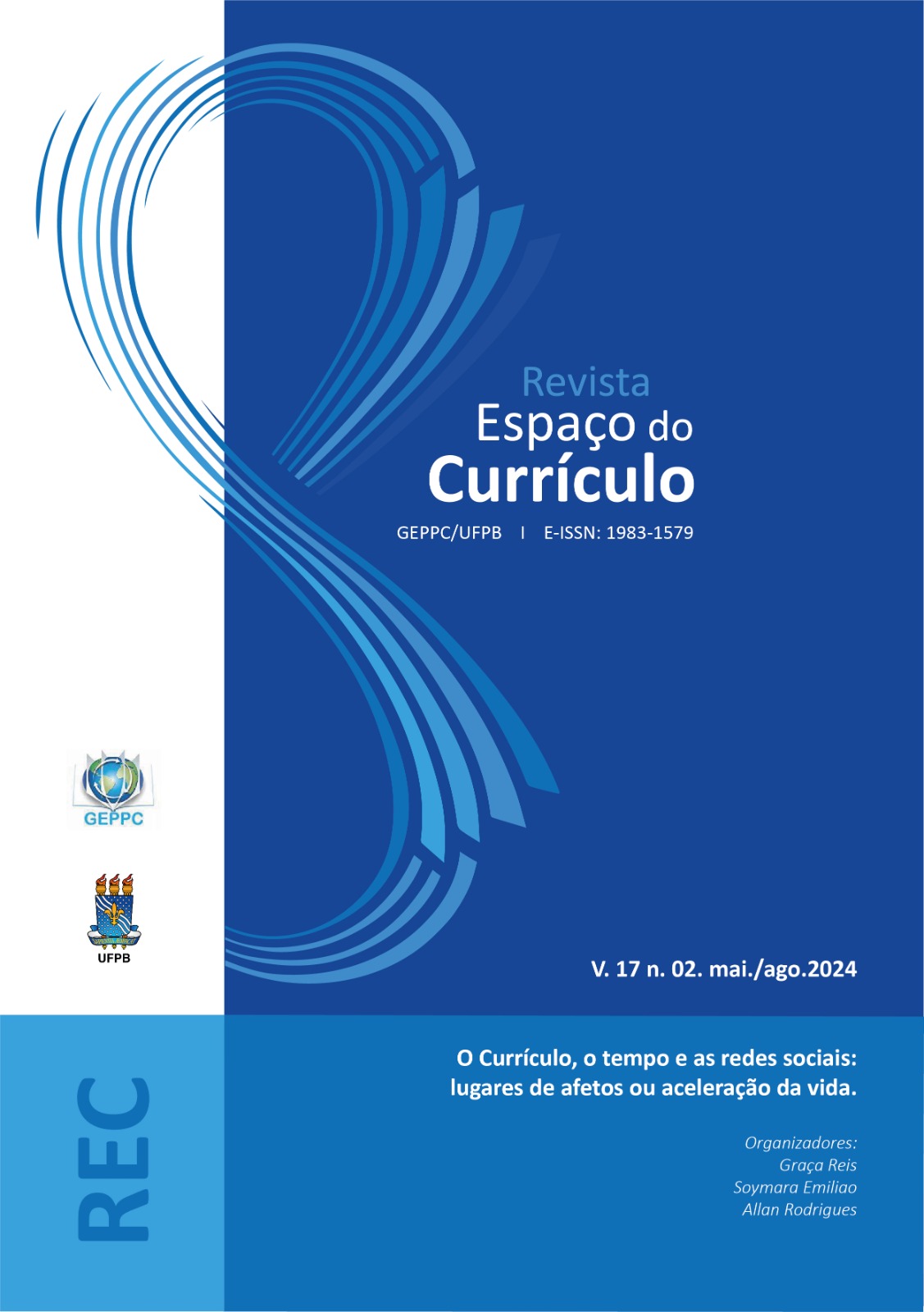INTEGRATED CURRICULUM IN THE EAD PEDAGOGICAL TRAINING COURSE
between different conceptions of teacher trainers
DOI:
https://doi.org/10.15687/rec.v17i2.67887Keywords:
Pedagogical Training, EAD, Integrated CurriculumAbstract
The study aimed to highlight the different conceptions of integrated curriculum of teacher trainers (non-graduates) with an emphasis on the Pedagogical Training course in the Distance Education (EAD) modality, through their narratives. Therefore, the research question is: What conceptions of integrated curriculum do the teachers who teach the EAD Pedagogical Training course have? Research with a qualitative approach and characteristic, whose data production used the technique of semi-structured interviews with teacher trainers. To analyze and discuss the data, we applied the method based on the theory of Content Analysis (Bardin, 1977). To produce the data, we first identified the teacher trainers who work on the course and carried out the interviews. In the analyses, we defined categories before and after the interview. The previous categories were defined based on the teachers' responses that are close to the theoretical framework on the integrated curriculum. The subsequent categories were produced after analyzing the interviews that enabled new understandings about the Integrated Curriculum. We found that the integrated curriculum in an educational institution belonging to the Federal Network of Professional and Technological Education (EPT) enables integration between general, technical and political training, and that progress is being made to open new paths in the development of pedagogical and political actions to transform the society.
Downloads
Metrics
No metrics found.
References
BARDIN, Laurence. Análise de conteúdo. Lisboa edições, 70, 225. 1977.
BERNSTEIN, Basil. A Estruturação do Discurso Pedagógico: classe, código e controle. Petrópolis: Vozes, 1996.
BRASIL. Constituição da República Federativa do Brasil de 1988.
BRASIL. Lei nº 9.394, de 20 de dezembro de 1996. Estabelece as diretrizes e bases da educação nacional. Brasília, DF, 20 dez. 1996. Disponível em http://www.planalto.gov.br. Acesso em: 10/05/2022.
BRASIL. Lei nº 11.892, de 29 de dezembro de 2008 – Institui a Rede Federal de Educação Profissional, Científica e Tecnológica, cria os Institutos Federais de Educação, Ciência e Tecnologia. Disponível em http://www.planalto.gov.br. Acesso em: 10/05/2022.
CHARLOT, Bernard. Da relação com o saber às práticas educativas. São Paulo: Cortez, 2013.
FAZENDA, Ivani Catarina Arantes. (Org.). (2008). O que é interdisciplinaridade? São Paulo. Cortez. (2001). Integração e interdisciplinaridade no ensino brasileiro: efetividade ou ideologia? São Paulo, Edições Loyola.
FRIGOTTO, Gaudêncio. Educação e a crise do capitalismo real. 2. ed. São Paulo: Cortez, 1996.
GRAMSCI, Antônio. Concepção dialética da História. Rio de Janeiro, Civilização Brasileira, 1978.
HERNÁNDEZ, Fernando. Transgressão e mudança na educação: Os projetos de trabalho. (Tradução de Jussara Haubert Rodrigues). Porto Alegre: Artmed, 1998.
HOFFMANN, Jussara. Avaliar para promover: as setas do caminho. Porto Alegre: Mediação, 2001.
INSTITUTO FEDERAL DE EDUCAÇÃO, CIÊNCIA E TECNOLOGIA FARROUPILHA. Resolução Consup, nº 009, de 26 de abril de 2019. Aprova o Plano de Desenvolvimento Institucional – PDI, 2019-2026. Disponível em https://sig.iffarroupilha.edu.br/sigrh/public/colegiados/filtro_busca.jsf. Acesso em: 10 mai.2022.
INSTITUTO FEDERAL DE EDUCAÇÃO, CIÊNCIA E TECNOLOGIA FARROUPILHA. Resolução Ad Referendum Consup nº 04, de 12 de maio de 2023. Aprova o ajuste curricular e as atualizações no Projeto Pedagógico (PPC) e altera as condições de oferta do Curso de Formação Pedagógica de Professores para Educação Profissional na modalidade de Educação à Distância. Disponível em: https://www.iffarroupilha.edu.br/component/k2/attachments/download/38371/e6b6633c136c40c307163d4171f21d56. Acesso em: 18 mai.2023.
LEVY, Pierre. As tecnologias da inteligência. O futuro do pensamento na era da informática. Tradução: Carlos Irineu da Costa. Rio de Janeiro: Editora 34, 1993.
MARX, Karl. Processo de trabalho e processo de produzir Mais-valia. In: O Capital 14. Rio de janeiro: Bertrand, 1989.
MILL, Daniel. Docência Virtual: uma visão crítica. Campinas, SP: Papirus, 2012.
MINAYO, Maria Cecília de Souza. (Org.). Pesquisa social: Teoria, Método e Criatividade. Petrópolis: Vozes, 1995.
NOSELLA, Paolo. O trabalho como princípio educativo – Palestra na aula inaugural nacional das turmas 2023 do Mestrado Profissional em Educação Profissional e Tecnológica (ProfEPT. Santa Maria. IFFAR, 2023. Disponível em: https://www.youtube.com/live/06VX5PgnExY?feature=share. Acesso em: 24 mar. 2023.
OLIVEIRA, Inês Barbosa de (Org.) Narrativas: outros conhecimentos, outras formas de expressão. Petrópolis: RJ: DP et Alii: Rio de Janeiro: FAPERJ, 2010.
SANTOMÉ, Jurjo Torres. Globalização e Interdisciplinaridade: o currículo integrado. Porto Alegre: Artmed, 1998.
SANTOS, Roberto Elísio. Aplicação da história em quadrinhos. Rev. Univerciência. Vol.08. nº 22, São Paulo: 2001. DOI: https://doi.org/10.11606/issn.2316-9125.v0i22p46-51
SAVIANI, Dermeval. Trabalho e Educação: fundamentos ontológicos e históricos. Revista Brasileira de Educação, São Paulo, v. 12, n. 34, 2007, p. 152-165. DOI: https://doi.org/10.1590/S1413-24782007000100012
SOUZA, Ângelo Ricardo. Explorando e construindo um conceito de gestão escolar democrática. Educação em Revista, Belo Horizonte, v. 25, n. 3, p.123-140, dez. 2009. DOI: https://doi.org/10.1590/S0102-46982009000300007
SPIES, Ketlin Lugiane; CAMBRAIA, Adão Caron. TPACK no uso das redes sociais numa escola pública. Revista Científica Trajetória Multicursos. v. 9, n.1, jun.jul.ago de 2018.
VYGOTSKY, Lev Semyonovich. Pensamento e Linguagem. São Paulo: Martins Fontes, 2008.
WAQUIL, Márcia Paul. Princípios da pesquisa científica em ambientes virtuais de aprendizagem: um olhar fundamentado no olhar do paradigma complexo. Tese (Doutorado) – Programa de Pós-Graduação em Educação, Faculdade de Educação, Universidade Federal do Rio Grande do Sul. Porto Alegre. 2008. 171. f. Disponível em: https://lume.ufrgs.br/handle/10183/13729. Acesso em: 24 mar. 2023.
Downloads
Published
How to Cite
Issue
Section
License
Copyright (c) 2024 Curriculum Space Journal

This work is licensed under a Creative Commons Attribution 4.0 International License.
By submitting an article to Curriculum Space Journal (CSJ) and having it approved, the authors agree to assign, without remuneration, the following rights to Curriculum Space Journal: first publication rights and permission for CSJ to redistribute this article. article and its metadata to the indexing and reference services that its editors deem appropriate.
















